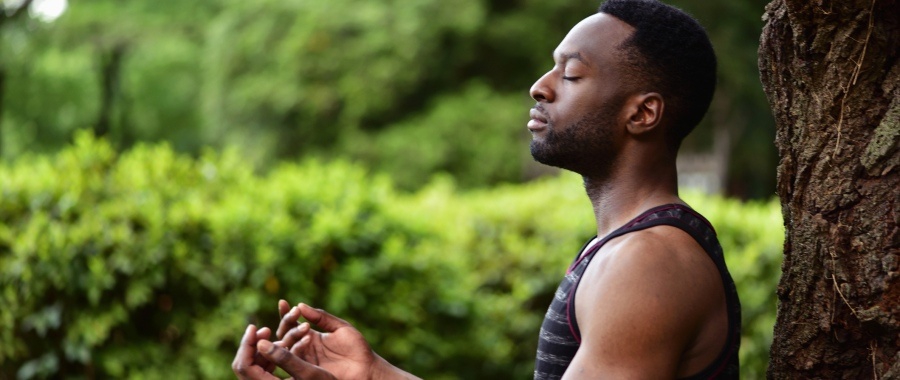The views expressed in our content reflect individual perspectives and do not represent the authoritative views of the Baha'i Faith.
When we think of safety, we usually think of the need to protect our physical bodies from harm, such as protecting our homes, hygiene habits, and preventing accidents. These are all important, but these will not protect our souls, our true selves.
Therefore, ultimate safety involves ways to protect this deeper part of ourselves. Baha’u’llah, the prophet and founder of the Baha’i Faith, mentioned three important ways in his writings: “The essence of true safety is to observe silence, to look at the end of things and to renounce the world.”
Let’s look at each of one these points.
Observe silence

There’s nothing inherently wrong with talking. It is one of our distinguishing features as human beings. Through speech, we can communicate with other people to make arrangements, accomplish things and express our thoughts and feelings. These are all valuable. The problem comes when our words become idle and cruel.
As Baha’u’llah explained: “… observe silence and refrain from idle talk. For the tongue is a smoldering fire, and excess of speech a deadly poison. Material fire consumeth the body, whereas the fire of the tongue devoureth both heart and soul. The force of the former lasteth but for a time, whilst the effects of the latter endureth a century.”
When our thoughts are idle, they lack mindfulness. When we speak idly, our words control us instead of us controlling them. We say things without really intending to. Sometimes, there is no harm done: we just chat about whatever comes to mind. But often, this idle talk can drift into dangerous territory — especially when we start talking about others.
There is nothing intrinsically bad about talking about other people, but unfortunately, it often focuses on that person’s faults. This is more harmful than we can imagine because the effects are so long-lasting. If someone physically harms another person, depending on the severity of the injury, it will heal in a matter of weeks or sometimes months. But if we speak badly about others, the ripple effect is much more devastating. This is because unlike a physical impact, words affect our minds and hearts. The people who hear these negative words about others internalize them. They begin to think negatively about that person, and may start mistreating them, though perhaps unconsciously. The negative energy in the words may even make them start having negative thoughts and feelings about life itself.
These thoughts and sentiments begin to infiltrate their sense of self and the words they voice to others as well. And so negativity breeds and perpetuates throughout the world.
This is clearly much worse than idle talk, but the two are nonetheless connected. When we speak idly, we can lack awareness. We can say things that we don’t mean and also things that we know we really shouldn’t say, and others’ opinions more easily sway us. Hence, idle talk easily and seamlessly leads into gossip and backbiting.
Observing silence doesn’t mean taking a vow of silence. To me, it means that we reside in silence, in inner calm and awareness. And out of this stillness, we speak when the time is right, when we have something meaningful, considered, and considerate to say.
We need to do our best to speak with love, but because we are not perfect, this is not effortless. It requires staying in control of our words and monitoring them so that hurtful ones don’t make their way out into the world. By being conscious and in control of our words, we protect the most treasured aspect of us all: the soul.
Look at the end of things

This means thinking about the potential consequences of our actions. More specifically, it means that before we act, we think about these potential outcomes. For example, if someone has given up drinking alcohol, it may not be the wisest decision to accept an invitation from their friends to go bar-hopping one night. It might be wiser to meet them at a cafe.
To look at the end of things, we have to be very honest with ourselves. We have to take an earnest look at the situation and our inner condition and gauge how capable we feel to pursue that path. “I just gave up drinking. I really don’t want to go back to it, but if I meet my friends at the bar, I might want to have a drink or two. I might get caught up in the moment and forget my own goals. I don’t think I’m ready to face that challenge now.”
We all face important decisions in life — times when we need to choose between walking the path of the soul or walking the path of the pretender. These decisions may appear rather benign on the surface, but when we look a little deeper and contemplate the steps involved, we may realise that a path is not going to allow our soul to shine, so it’s better to choose another route.
This is especially important when our actions have a direct impact on other people. For example, every ounce of CO2 we unleash into the atmosphere equates to a rise in sea levels that will swallow the farmland and hence livelihood of people in places like Bangladesh. Each individual now must carefully consider their carbon-footprint and how it bears weight on others. For those in positions of power, this responsibility is even weightier because the repercussions are compounded.
Renounce the world
When we think of renunciation, we often picture a person who joins a monastic order. They give away all their money and possessions, discard their conventional attire, and retire to a secluded monastery to live a life of prayer and meditation. This is a very literal interpretation of renunciation, but what Baha’u’llah meant is that we should renounce everything except God.
Baha’u’llah encouraged people to live a full life in the world and even encouraged the monks of his time to leave their monasteries and start a family. What Baha’u’llah meant by renunciation is that we should let go of our attachment to the things of the world. This is expressed in the following quote from his writings: “Turn thy face unto Mine and renounce all save Me; for My sovereignty endureth and My dominion perisheth not. If thou seekest another than Me, yea, if thou searchest the universe forevermore, thy quest will be in vain.”
Physically detaching ourselves from the world might seem like the obvious thing to do if we are trying to relinquish our attachment to things. After all, if someone can’t stop fretting over their new Mercedes, wouldn’t it be better to simply live without it? Wouldn’t they be more at peace?
They might. But after they got rid of it, they might still think about the car, even regretting their decision to relinquish it. Even if we get rid of everything, there will always be some things we simply can’t do without. We all need to eat and sleep, so inevitably, we will need some physical objects for these ends. But even these simple objects can be a source of attachment. The things themselves are not the problem; it is our attachment to them.
But what is so harmful about being attached to things? How does this damage the soul? When we are obsessed with the things of the world, we forget about God and our true purpose in life: to serve Him by serving others. Instead, we become fixated on finding fame, wealth, or pleasure. But these aims are fickle and fleeting. Even if we do attain these things, the reward will be short-lived. We will reach a time when more money doesn’t make us any happier, when our fame is more of a curse than a blessing, when no amount of chocolate cake can fill the chasm in our soul. But the real danger lies in never knowing this, in perpetually hunting happiness in the material world, when it can only be attained in the spiritual world.

God’s blessings are throughout creation, and he wants us to enjoy them. He wants us to enjoy time with our loved ones, savor wholesome food, see the beauty of nature. But we can do so without clinging to these things. We can see all the goodness in the world as doorways to the divine.
In the end, the soul is the most precious thing we have. Everything else will wither and fade, which is why we do our best to protect it.
















Comments
Sign in or create an account
Continue with Googleor